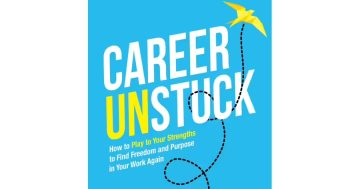
Countless high-potential professionals miss opportunities because they convince themselves they are not ready to take action. Photo: File.
Even if the meek are supposed to inherit the earth, they rarely do well in today’s competitive workplace. May Busch has advice for those fearful of asking for a promotion, or of putting themselves forward for a difficult assignment.
Have you ever talked yourself out of doing or saying something because you were afraid and later regretted it?
Like being afraid to mention an idea in a meeting only to have a colleague make the same point and get all the praise.
Or not applying for a role because you don’t meet all the qualifications only to find out the job went to somebody with even fewer qualifications than you.
I’ve seen countless high-potential professionals (including myself) miss opportunities because they let fear get in the way, so they talked themselves out of taking action.
What causes perfectly capable people to give in to fear, play it safe and not go for things?
There’s a part of the brain that’s responsible for keeping us safe from risk. For some of us, it’s the fear of failure, which leads to embarrassment and shame.
For others, it could be the risk of success — the kind that alienates our colleagues, friends and family.
While that fear-based part of your brain was essential in prehistoric times to signal you should run when a hairy mammoth comes at you, it’s not so useful now.
In fact, it can keep you from going for opportunities, making a bigger impact and living your best life.
For Stu, playing it safe meant keeping his head down, working hard and not making waves.
Instead of putting himself forward, he stuck to the role he knew, doing the same things in the same way, waiting for his turn to be tapped for a bigger role.
That role never came; it was as though he was invisible to management, staying stuck while others zoomed past him because they were willing to take some calculated risks like expressing their desire to present at the client meeting, or represent the department at a conference.
These acts of omission are the things you thought of doing, but didn’t take action on because you talked yourself out of it.
They’re the times you didn’t stand up for what you believed in, or back yourself and your aspirations.
Your acts of omission are more often the cause for regret than the things you did do – your acts of commission.
After all, when the things you do turn out badly, you still learn from them, which is a win.
Even a negative outcome can create connections, relationships, and experiences that put you in a great position for future opportunities.
Taking action usually leads to opportunities, even if you can’t see them right away, but the regret from not taking action just because you’re afraid eats away at you over time.
So, what can we do to overcome the fear that holds us back from taking action toward our aspirations?
Identify the cause of your hesitation: Is it advice you received from someone you respect? Is it a societal expectation that’s ingrained in you?
Or is it your own prehistoric ‘lizard brain’ trying to protect you from imagined harm.
Assess whether it’s legitimate: Ask yourself: “What facts do I have to support this?” It’s like those courtroom dramas where the judge disallows hearsay evidence that’s not based on anything factual.
You just need to remember to be the defence lawyer who leaps to their feet to say “objection” to stop the negative thought that isn’t supported by facts.
Address any legitimate concerns: You achieve this by negotiating for what you need, or creating an experiment that doesn’t bet your career, but still gives you information that you are on the right track.
For example, if you’re afraid you’ll burn out if you take the ambitious new opportunity, see if you can negotiate for staff support, establish boundaries and set realistic expectations.
If you’re worried about asking your boss for a raise, you can experiment by practising your script with a trusted mentor.
At some point, it’s time to acknowledge the fear and do it anyway. You’ll be surprised at how much you can accomplish when you learn to do things when you’re scared.
Whether it’s being the main breadwinner in your family or finally being in the career you dreamed of, it’s natural to want to hold on to what you have.
However, don’t use that as an excuse to play small. Backing yourself means taking proactive steps to put yourself in the best position to reach your aspirations.
You don’t need to be an intrepid explorer who sets out to sail around the world to prove the world is round and not flat.
It’s about taking steps, even if they’re baby steps.
Remember, careers are built on momentum — and taking steps toward your bigger goals is what starts the momentum going in your favour.
So enough with the acts of omission: Notice when you start talking yourself out of going for things, whether that’s speaking up, signing up or negotiating for what you deserve.
Leap up and say “objection” to put those fearful thoughts back in their place. Then go for it — all of it.
May Busch’s mission is to help leaders and their organisations achieve their full potential. She works with smart entrepreneurs and top managements to build their businesses. She can be contacted at [email protected].
This article first appeared on May’s blogsite.











